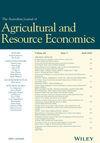应对食品欺诈的最佳政策
IF 1.4
4区 经济学
Q3 AGRICULTURAL ECONOMICS & POLICY
引用次数: 3
摘要
本研究分析了政府对食品欺诈的最佳反应,同时考虑了食品欺诈对消费者和生产者的不对称影响、生产者质量选择的内生性以及食品欺诈检测概率的不对称性。虽然从理论上讲,政府可以通过大幅增加认证成本和/或监督惩罚系统来遏制食品欺诈,但分析表明,最佳政策应对措施取决于不诚实生产者的效率、食品欺诈的类型、政府的政治目标以及不同类型执法的相对成本。除了解释食品欺诈的不对称效应外,对代理人异质性和生产者质量内生性的明确考虑使我们能够表明,与传统观念相反,强制执行对标签纯度和平均产品质量的影响取决于不诚实生产者的效率。有趣的是,当公共执法机构官员参与贿赂时,没有解决腐败问题的监督和惩罚系统并没有减少欺诈行为,反而增加了实施欺诈的动机。本文章由计算机程序翻译,如有差异,请以英文原文为准。
Optimal Policy Response to Food Fraud
This study analyzes the optimal response of the government to food fraud while accounting for the asymmetric effects of food fraud on consumers and producers, the endogeneity of the producer quality choice, and asymmetries in the probability of food fraud detection. While the government can, theoretically, deter food fraud through a significant increase in the certification costs and/or the monitoring-punishing system, the analysis shows that the optimal policy response depends on the efficiency of dishonest producers, the type of food fraud, the political objectives of the government, and the relative costs of different types of enforcement. In addition to accounting for the asymmetric effects of food fraud, the explicit consideration of agent heterogeneity and the endogeneity of the producer quality enables us to show that, contrary to what is traditionally beleived, the effect of enforcement on the purity of labeling and the average product quality depends on the efficiency of dishonest producers. Intriguingly, when the public law enforcement agency officials engage in bribery, the monitoring and punishment system without addressing corruption does not decrease the fraudulent behavior but, instead, increases the incentives to commit fraud.
求助全文
通过发布文献求助,成功后即可免费获取论文全文。
去求助
来源期刊

Journal of Agricultural and Resource Economics
社会科学-农业经济与政策
CiteScore
2.30
自引率
7.10%
发文量
0
审稿时长
>36 weeks
期刊介绍:
The mission of the Journal of Agricultural and Resource Economics is to publish creative and scholarly economic studies in agriculture, natural resources, and related areas. Manuscripts dealing with the economics of food and agriculture, natural resources and the environment, human resources, and rural development issues are especially encouraged. The Journal provides a forum for topics of interest to those performing economic research as well as to those involved with economic policy and education. Submission of comments on articles previously published in the Journal is welcomed.
 求助内容:
求助内容: 应助结果提醒方式:
应助结果提醒方式:


